Aarushi Avirook Sen Pdf Free Download
Avirook Sen's Aarushi highlights the coldness of the judiciary
Avirook Sen's compelling book on the Aarushi case highlights the CBI's willingness to resort to unethical means to close cases, the insensitivity of the judiciary, and the appalling bad luck of the Talwars.
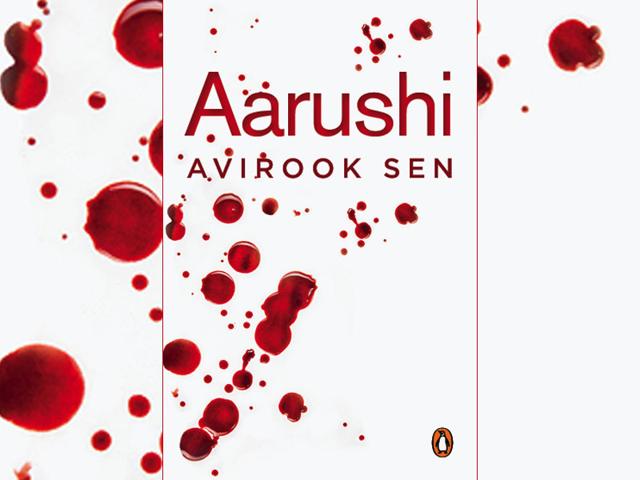
Book: Aarushi
Author: Avirook Sen
Publisher: Penguin
Price: Rs 299
Pages: 302
The murder of 14-year-old Aarushi Talwar and Hemraj, the family domestic help, at home in Noida on 15-16 May 2008, horrified the nation while also revealing our relentless voyeurism. The teenager's parents Nupur and Rajesh Talwar were accused of the double murder and convicted. Seven years after the murder, Avirook Sen's book combines interviews and an examination of documents to come up with an account that reveals the Kafkaesque nature of the Indian judicial system.
You covered the Aarushi case...
Yeah. Fragments of the book were written here and there but it came together only post the judgement. The book is substantially different from the reports (in Mumbai Mirror). There was a lot of additional reporting that I did post the verdict because the verdict itself raised many questions for me and I thought why not pursue those?
The bit about the judge Shyam Lal…
Have you read the judgement?
I read the excerpts. What is that?
What he does in the judgement, and the language, is inexplicable. I can't understand why. The use of, for instance, the synonyms for penis. I felt I must ask him this: What were you thinking when you were writing this? In the end, you're convicting two people to life; it's very serious. I think you need to strike a restrained note. Because, in the end, what you're dealing out to them is a fate as bad as death. So why do it in this manner? Which is why it was important for me to get to Shyam Lal. He never gave interviews to anybody.
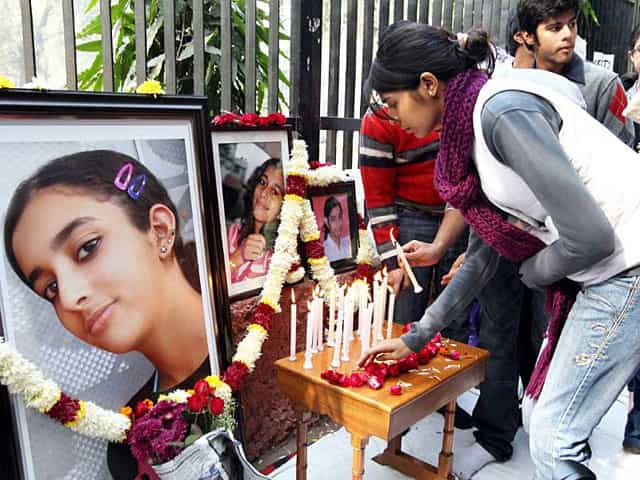
On 16th May 2008, Aarushi Talwar, daughter of a dentist couple, was found dead in the bedroom of her flat in Jalvayu Vihar, Noida.(HT photo)
So how did he agree to meet you?
I accosted him. I went straight to his chamber in Allahabad, sat down in front of him and said without you this book is not happening. He kind of knew me from the trial days because there was a point at which the CBI public prosecutor tried to get me thrown out of the court… because of the nature of the reports I was filing. So we had this rocky relationship, the CBI people and I, at that time.
AGL Kaul who manipulated things, why was he so vicious; what could have been his motivations?
For a number of these people, it's value within their organisation. That's all they feel that counts for them. Kaul was on that ODI (Officers of Doubtful Integrity) list already; he had been bypassed for promotion a couple of times, so it was important that he rise at least to the rank of SP. He was drawn from the regular constabulary but because of all these complications he had to go out and prove himself. It's a personal motivation. Kaul had a track record of doing this kind of thing. He's done it in the Shehla Masood case; he's done it in the Amit Jogi case, so this sort of thing is actually encouraged in the CBI, evidently.
The CBI comes out as horrible in the book.
Yeah; the need to close cases… Just like mafia people and hitmen, I think the agencies have people who can close. For me, it's an accurate enough parallel. There are certain people for certain jobs. Kaul had value within the organisation because of that and I think it was important for him that he retain that value.
Doesn't the CBI have an operating procedure that says you can't do certain things?
I'm sure they do but… Take a simple example from the book: Why did they create that email ID? (referring to the deliberately cruel hemraj.jalvayuvihar@gmail.com ID that Kaul created to communicate with the Talwars)
That is unethical.
What kind of mind would do that? Those emails that are CCd - in the loop are people from the director down to the inspector. Nobody is saying anything internally. These emails are then submitted to various courts including the Supreme Court. Perhaps it's a small thing; you could argue that it's only an email address.
But it reveals so much about methods and mindset.
Exactly. And what is the default reaction when you ask a question about it? My interaction with the CBI spokesperson Dharini Mishra - the first thing they say is 'Oh this is not possible; You must be joking' And then you have to tell them, 'I'm sorry I'm not making this up. The Talwars haven't given me this; I'm just reading your damn submission to the Supreme Court, no less. So suddenly out of the blue there is this two-line PTI story that comes out saying such a thing was done during the investigation. That also is false. It continued well after the investigations. But I didn't want to bang on about it; I think I'd made my point. I'm anticipating a question from you, and it's on everyone's mind: why did all these people go after the Talwars?
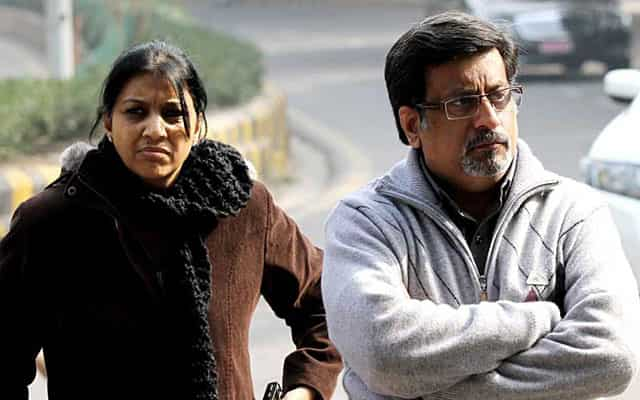
After huge hue and cry over Noida police's theory, the case was handed over to CBI in June 2008. CBI blamed Noida police for shoddy investigation and on June 13, Rajesh Talwar's compounder Krishna was arrested. (HT photo)
Well, it could happen to anybody.
This is true when you get embroiled in something like this. In this case, if we set aside all the class-society issues and all the big politics that's going on, I'm trying to explain to you why this is such a perfect storm. You have an investigator who has a track record of unscrupulousness, who has been given a brief to close the case because that's his value to the CBI. He comes into the case when, out of all the five suspects, only two are within reach. And, in any case, public perception is on his side. There was a media problem, which put pressure on the new director. People asked, 'Why isn't this case closed?' You have this person with a proven record of underhandedness; then a forensic scientist comes into the picture, who has a superbly fertile imagination. He should be writing in Nature because he can divine from photographs the fact that there are two blood groups present in the splatter on the wall.
How could the court not see all this?
The question to ask actually is does the court have the capacity to understand forensic science? Actually, it's not complex. I'm not a scientist but a lot of the reports are self-interpretable. But you need to apply your mind to it.
So you've got, first, the investigator, then you've got the forensic scientist. These are two separate people; they just happened to come into the case. Once again with a track record of imagining things. I refer you to Godhra where he says this mayhem takes place at this compartment, where these doors are broken and there's petrol and miscreants come in. But not a single witness - those that survived - remember any of this happening. In that case, it's turned into something else which is insidious actually. They said they couldn't identify anyone. That's not the point. The point is did the events actually take place or not? Third, you have a judge who's called Saza Lal, who can't, in my interview of him, remember a single person who he has acquitted. When you put these together… There's no conspiracy here.
Yes, it's just horrible luck.
People say 'There must be something because all of these people cannot conspire. What I say is actually its individual events and circumstances that somehow or the other concatenate.
The interest in the case is not as high as it used to be.
What's happened with the book is - and, in a way, I feel gratified by it - that it's back in the conversation. Somewhere someone's saying, "Boss, look, let's ask some questions now. How did this happen?" I think the equipment for this question or the tools for this question were not there, were not put together in any form and that's what this book does. I think, even today, there'd be plenty of people who say, 'No, the Talwars are guilty.' I'm saying if you hold that opinion, it's fine, you are entitled to it, but hold now an informed opinion. Look at the stuff - it's really all a matter of record. There's no invention here. It is the CBI's own papers that I've depended upon; their own witness testimonies. The matter is in court. So look at it and by the end of it, by all means, continue in your conviction. But look at it.
In the early days, why were there rumours about the Talwars' sex lives?
That comes from one single source. It starts happening when Krishna's picked up. Now for a murderer - I'm not calling Krishna a murderer. I shouldn't because then I'd be doing the same thing as everybody else. I'm saying any murderer… Suppose I had murdered two people and then next morning, I find that the police has only discovered one body and is suspecting the other person who is killed. What a bloody windfall for me! I could not have planned this better. So what do I do? I get 24-hour lead time during which I'm picked up by the police and questioned so I feed to them a story that implicates that man initially; say he had eyes for this person and whatnot. When the body is discovered, this story fits very well with the honour killing motive because he'd already said that there was this thing.
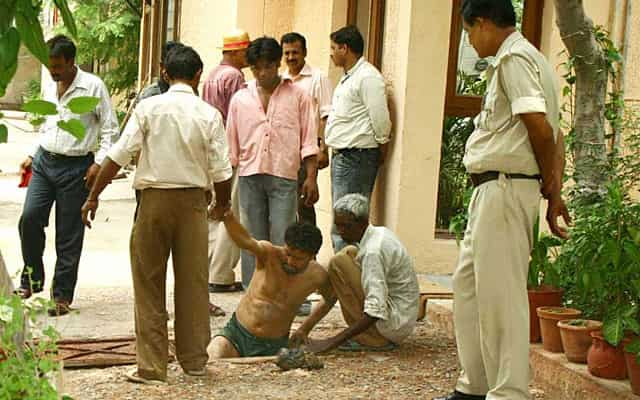
Talwars' family friends Duranis' Nepalese domestic help Rajkumar arrested on the suspicion of involvement in the murder. (HT photo)
Then the same chap would start talking about all the debauchery… The wife swapping story came in a very strange way. This IG police Gurdarshan Singh called them debauched characters. That got splashed around everywhere. Then, about a month later, the NOIDA police receives a complaint from some old man saying, 'In my neighbourhood, nefarious activities or group sex is going on. It must stop'. So NOIDA police go to this area; they find nothing but they say this is in the general vicinity of the Talwars'. And then the story is spun in Mid-day. That's the beginning. You see, it's a very attractive story because they are already 'debauched' suspects of murder now. The serious note it's striking is that, 'Look what's hidden in our pretty little middle class'.
What was the most difficult part about writing this book in terms of reportage?
That I genuinely enjoy even on days when I don't get anything; I don't come back home disappointed. I like to put my feet on the ground. I can't do arm chair stuff, which is why this sort of thing suits me and I'm quite anal about evidence and facts. I don't like assumptions. I like the idea of going through documents looking for things which may have been missed, cross-referencing... Physically, it was very taxing. To get to Ghaziabad from here and the court is bang inside the old town so the traffic and the disorder… But it's also very attractive. I love to look at what's going on. I go to court and hear, "Oh, there's a shootout on the second floor and they came in bowler hats!"
There were parts where I had to put down the book and laugh. This shootout by a man in a bowler hat was one. The thing is I can't make a joke like that up. Jumping from that first floor onto a waiting Santro and…
You can't make it up.
And then that Charan Singh statue (outside Ghaziabad court) - it's like he's doing a yoga pose. Then, I go to court all the way, sweating, and hear 'Aaj toh strike ho gaya' or 'Nahin, ladies ka problem ho gaya. Karva chauth' with the Bar Association saying, "Our female colleagues are having difficulty because they are having to maintain fast so no court'. I found it hilarious. It was sad also, but I'm glad that this sort of thing was also going on. Otherwise, it was very depressing on a daily basis to be hearing shit.
What about the Talwars themselves? To lose your child and then to be accused of murdering her…
This is the question that I asked them several times. Nupur says the basic fact is that 'Look, we don't even have the time to grieve'. She says that we are so preoccupied with our own protection that sometimes we don't think enough of her. She is ridden with guilt about this.
Those three boys, where are they?
Honest answer, I don't know. They could be anywhere. Krishna and Rajkumar are likely in Nepal and the third in Chandni Chowk somewhere, just lost in the shops there or has gone back to his village, I don't know.
Scary. One or two or all three of them are killers.
Absolutely.
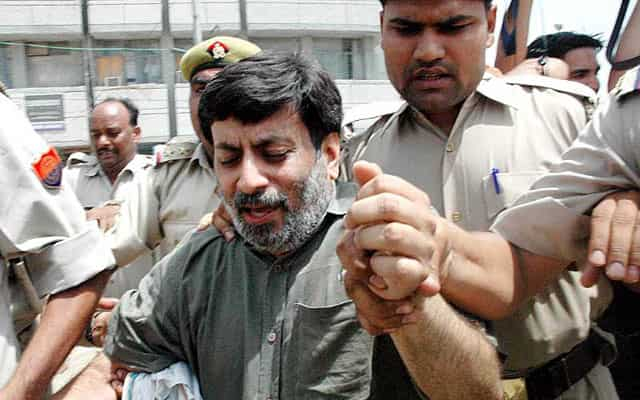
On May 23, 2008, police arrested Aarushi's father Rajesh Talwar accusing him for the double murder. (HT photo)
Your book is like Meenal Baghel's Death in Mumbai (on the Maria Susairaj- Neeraj Grover case). There's a great interest in the In Cold Blood genre.
This book is not different by genre. By category, it's non-fiction crime, true crime… But this book is different from all these other books for one reason - these books generally are a settled prosecution point of view. In Cold Blood, the case is settled. You know exactly how these things happened. In Meenal's book, the case is settled; you know exactly how a conviction happens. This is different. This is an investigation of an investigation because it is actually challenging everything that the prosecutor is saying.
It is also exposing.
Yes, because it's saying 'This was suppressed' and 'This, you didn't read properly; that you missed'.
Do you think the book will have an effect in terms of what's going to happen to the Talwars?
I can't say. My hope was that. As a journalist, if I see that day after day, some crap is going on in court, every day they are telling lies, some manipulation is happening, I must find out about it. It's in that process that all of these things came out. So there was no goal set. But this book brings to light new material:
1) The judge writing the judgement before the final argument ends. That's new material. I don't know how the courts will look at it. Already we talk about judicial delay. Now, if you are going to write the judgement before the arguments end, why have the process at all? Drop the process. It's a long process; it takes another 14-15 days. The spin given to it is they (Judge Shyam Lal and his son) were taking notes. They were not taking notes. It is very clear in the interview what they were doing. They were choosing words be used in those first 10 pages. Every one of those is a tool for indictment. What does he say in the end? 'freaks of nature' , 'fiendish and flagitious', 'peignoir'!
2) Judge Shyam Lal wanted to write himself into history. This was his last case. Incidentally, he's got that judgement printed, bound and distributed in the Allahabad Bar and among judges in the Allahabad high court.
They all think it is great?
I have no idea what they think. He's proud of this piece of work. I want to give him a copy of this book in exchange for one of those.
What was the most rewarding part of the project?
I realised I've nailed it. I say this without holding back. As a piece of work, I've nailed it. Because I was able to keep to one discipline and make every damn thing in the book attributable. There's not a single line in the book which I can't point to a source. It doesn't have a bibliography. Most of this is written into the text. So there is no unnamed source. It was very gratifying. Whoever I spoke to - some people were stung - I had to do that but it was very important for me to have them on record. Others chose to speak to me and I told them I'm writing a book.
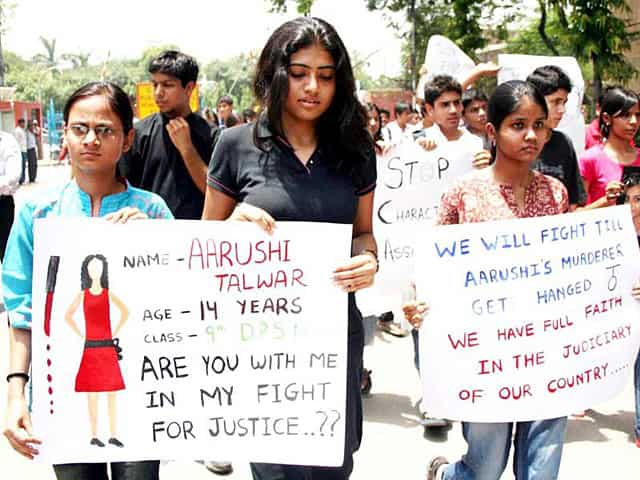
Supreme Court bench instructed the media to be careful in the context of the hearing of a public interest lawsuit that has raised questions on the media coverage of the high-profile murder case.(HT photo)
What do you regret?
Plenty of things. If by any means I could have gotten to the servants, it would have added to the book. I don't know what they would have said. I did try but it was a dead end. So I failed.
Nobody knows where they are.
Nobody that I spoke to.
But Kaul would have known.
Yes, but Kaul is not reachable. Do you know that Kaul died exactly on the day that I finished the manuscript? Strange coincidence. I've been getting this: "How are you speaking so ill of the dead?" My counter question to this is "OK, the 13-year-old girl who died; what did this man say about this dead girl in the court and to the public?"
Get our Daily News Capsule
Get our Daily News Capsule
Thank you for subscribing to our Daily News Capsule newsletter.
Close Story
- Horoscope Today
- India vs New Zealand 2nd Test
- National Pollution Control Day 2021
- Parliament Winter Session 2021 LIVE
- Cyclone Jawad
- India Covid-19 Cases
- Omicron Covid-19 variant
- Omicron
- HTLS 2021
- The Railway Men
Story Saved
Source: https://www.hindustantimes.com/books/avirook-sen-s-aarushi-highlights-the-coldness-of-the-judiciary/story-wLTHac4Bg4bLzAi8ujng2L.html
Posted by: jenaejenaeasfoure0272363.blogspot.com
Post a Comment for "Aarushi Avirook Sen Pdf Free Download"